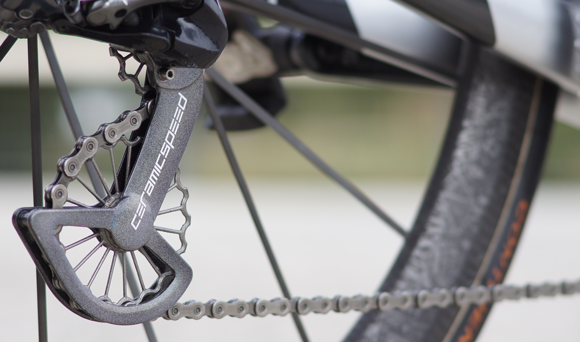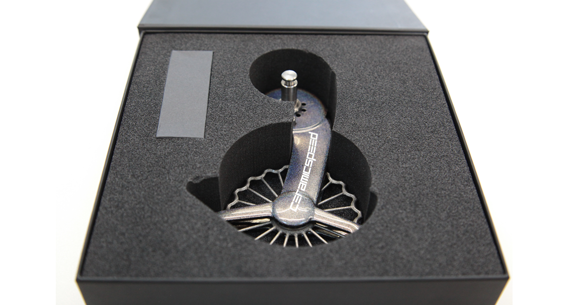World’s lightest cycle gear wheel additively manufactured and tested by Tour de France racers
August 29, 2019

CeramicSpeed, Holstebro, Denmark, and the Danish Technological Institute (DTI) in Taastrup, have collaborated to additively manufacture a lightweight titanium pulley wheel for a race-bike gearing system, aimed at professional cyclists. The radical new design, reported to be the world’s lightest gear wheel, was race-condition tested by competitors from this year’s Tour de France.
The pulleys, manufactured on SLM Solutions’ SLM®500 metal AM system, are equipped with seventeen spokes with a diameter of 2 mm and a wall thickness of only 0.4 mm. Due to the hollow design, it has been possible to reduce the total weight of the sprocket to just 8.4 g.
“The hollow geometry of the objects cannot be produced with conventional methods, and the 3D printing in combination with subsequent specialised processes leads to a unique innovative product,” stated Thor Bramsen, Industrialisation Manager at the Danish Technological Institute. Despite the complex geometry, DTI is able to reliably build the same quality parts in series production.
CeramicSpeed states that its R&D department have been testing the wear on the additively manufactured titanium parts, which proved to be more durable and suitable for corrosion resistance and strength at low density than conventional aluminium parts.

To offer serial production of a high-quality, additively manufactured product, it is stated that the entire process chain must be coordinated. The process begins with the component redesign for the additive process, in this case a delicate mix of not changing the customers design, while adding material for surfaces that require CNC machining, optimising support, and minimising wall thickness and weight. After successful production, the equally challenging, yet important post-processing steps take place, where the Danish Technological Institute uses its entire range of manufacturing knowledge, ensuring that only assembly is required when the finished product is delivered.
“3D printing technology has given us a lot of leeway to experiment creatively with design, while at the same time being able to optimise a product’s function,” commented, Carsten Ebbesen, R&D Manager at CeramicSpeed. “The collaboration with DTI has led us to develop and produce gears in a radically new design form that is only possible with 3D printing.”
The first ceramic bearings from CeramicSpeed were introduced to the Tour de France less than twenty years ago. Thanks to the design provided by Selective Laser Melting, and its partnership with the DTI, the company continues to develop cycling technology and is helping set new standards as riders test the latest innovations in their training to be the next to debut new advancements at future Tour de France races.
















